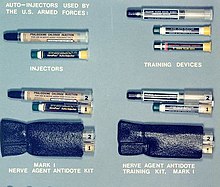Auto-injector
An autoinjector is a medical instrument that is used to administer ( inject ) a single dose of a liquid drug . In particular, it was developed so that the injection can also be carried out by the patient himself.
construction
The structure of an autoinjector is similar to that of a syringe , but when it is transported, the injection needle is located behind a membrane and thus inside the housing.
If the contained medication is required, the auto-injector is pressed firmly onto a (content-dependent) point, which triggers a contained, mostly spring- based mechanism. This sticks the needle into the corresponding part of the body, it is thus the contained drug, z. B. injected intramuscularly or subcutaneously . This mode of operation should make it as easy to use as possible (e.g. with just one hand, in the event of injuries, at night, etc.) and also avoid the widespread fear of needles .
use
Auto-injectors are mainly used where even untrained people have to give injections quickly. The best-known examples are auto-injectors for adrenaline for the acute control of anaphylactic shocks in allergy sufferers and for the injection of obidoxime chloride and atropine in people who have come into contact with chemical weapons . So auto-injectors would e.g. B. issued to soldiers in the event of a defense . Troops on certain missions abroad (e.g. ISAF ) carry morphine auto-injectors with them.
Problems
The autoinjectors, which are permanently z. B. are carried by soldiers, are exposed to the changing temperatures in missions that are not comparable with the prescribed storage conditions of a pharmacy, which serve the standardized compliance with the determined expiry date. If the auto-injectors are carried along under uncontrolled conditions for a certain period of time, at some point it is completely unclear what thermal loads they were exposed to. As a result, in case of doubt, no reliable statement can be made about accelerated decomposition of the active ingredient and the rest of the active ingredient content in the autoinjector. Furthermore, the issue of auto-injectors to soldiers is a legal gray area: the morphine auto-injectors are subject to the Narcotics Act and should therefore only be used by licensed doctors. However, the circumstances of an assignment abroad do not always allow prompt treatment by a doctor. For this reason, soldiers receive the injectors prophylactically for use against a signature and must be able to return them after the end of the mission or to be able to attest to their destruction.

